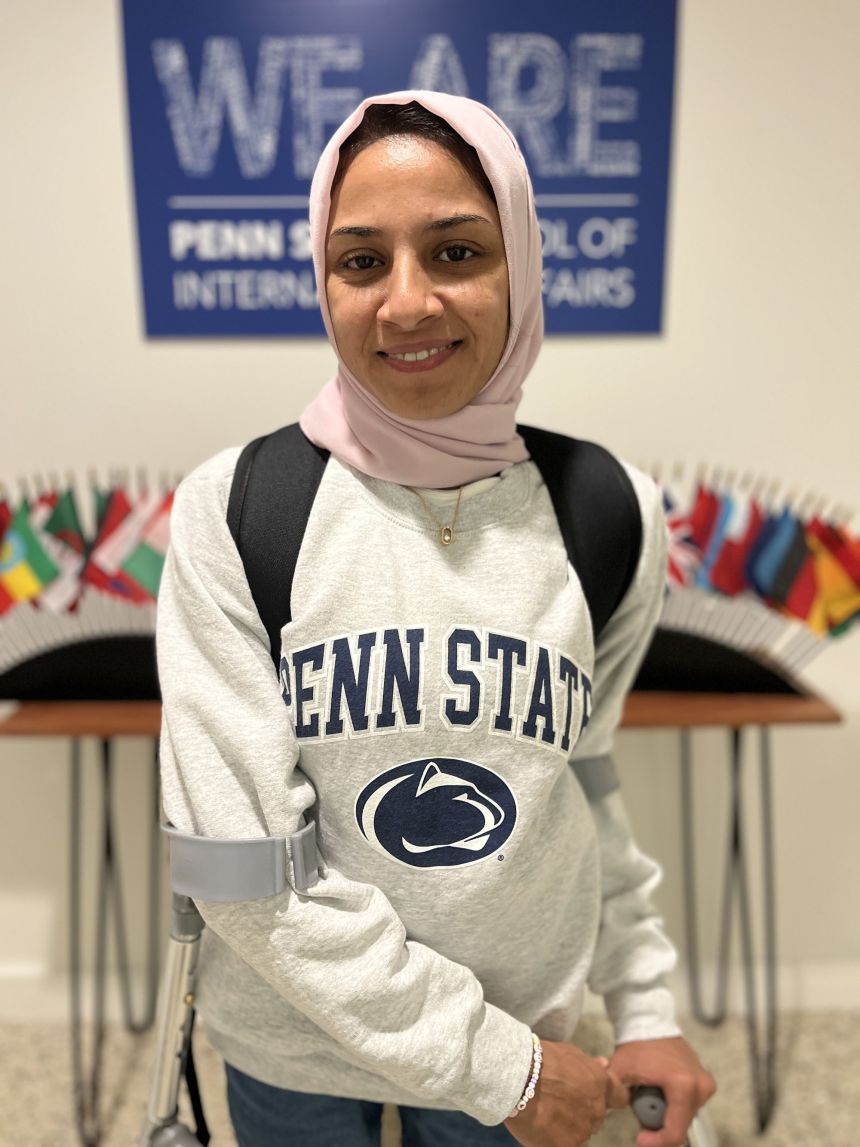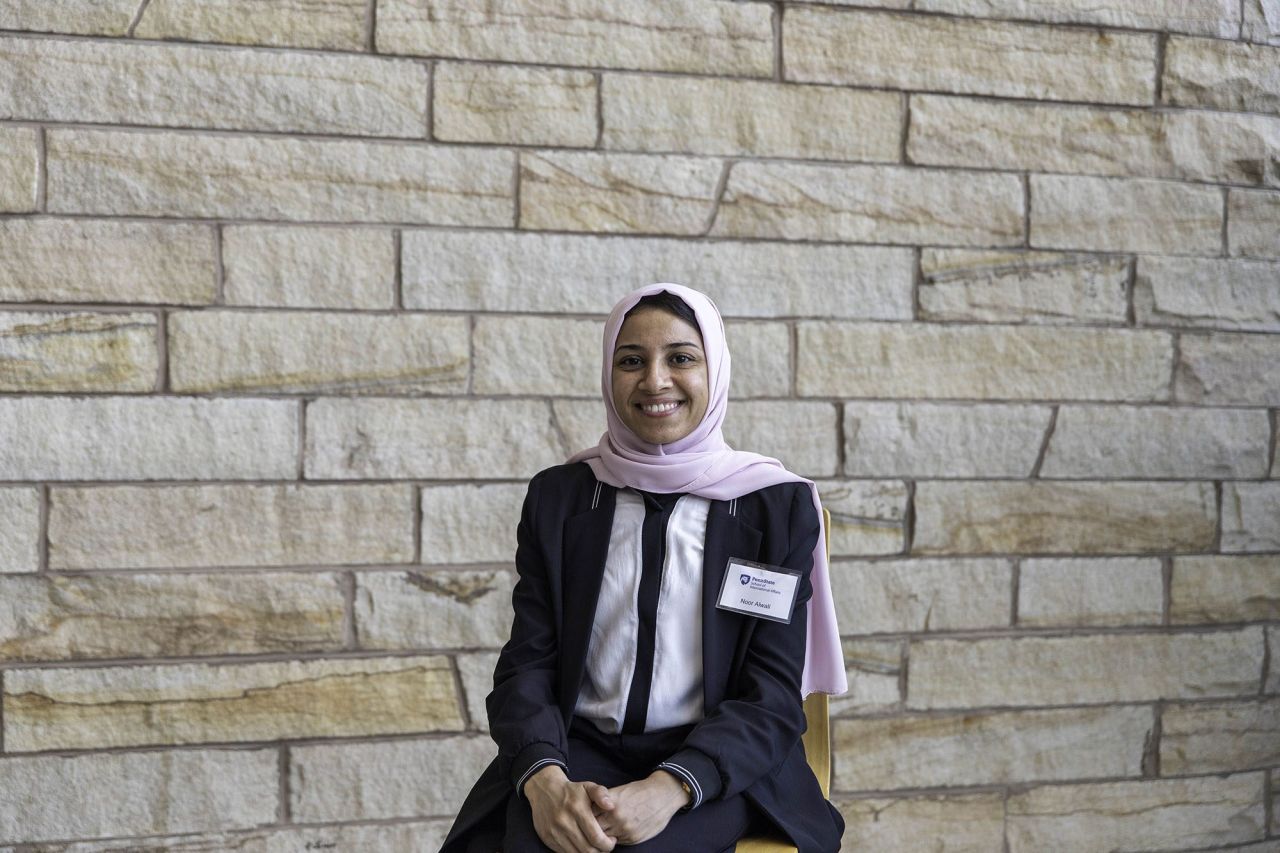October 13, 2023
From Iraq to State College: an SIA student’s journey to a career in politics

UNIVERSITY PARK, Pa—Noor Alwali has always been a good student. When she graduated high school, like most female Iraqis, she didn’t get to choose what she wanted to study—it was chosen for her. She was told she would study Translation at the University of Basrah. She graduated with honors, both for her undergraduate and graduate degrees. Alwali found her passion in political translation and finally as a community leadership coordinator because she cares about what’s going on in the world. “I see myself working in Washington, D.C. or New York in the future—where the international agencies are,” said Alwali. It was her passion and her goals that led her to the Penn State School of International Affairs (SIA) in University Park, Pennsylvania.
“Noor has been through an arduous journey to get here,” said Mitchell Smith, director of the School of international Affairs, professor of international affairs. “Since her arrival she has engaged intensively in every aspect of our program, including international affairs discussions outside the classroom. Our global community is richer for her presence and we in SIA are so glad she found her way to our program,” Smith added.
With the goal of working in a senior management position, Alwali was very strategic when she applied to 11 schools focused on international affairs—three in the United States, including Penn State University School of International Affairs; four in Europe, three in Canada, and one in the Middle East.
“Penn State SIA was my first choice,” started Alwali, “I thought it would be the last university who would admit me because it was competitive and high-ranked. It had a reputation.” With little hope that she would be accepted to SIA, Alwali put more effort into her other applications.
SIA was the first acceptance that she received, “I’ve read many great stories from applicants over the years, but Noor’s was compelling, thoughtful, and powerful,” said Matt Detrick, assistant director of admissions at SIA. “I knew right away that she would contribute greatly to our community and someone we would be extremely proud of once she graduates!”
Alwali could not believe that she was accepted. She thought they had made a mistake. She asked her friend to confirm that her acceptance was real. She did her research and attended every Zoom session with SIA professors. “The Zoom sessions in the summer, with the professors, were amazing!” she exclaimed. “They gave me an idea about the environment and the rich experience at SIA.”
Learning about the extensive experience of SIA professors in their fields and convinced that SIA’s professional program was exactly what she needed to advance toward her career objectives, Alwali rushed to secure her place in the entering class. A generous SIA merit scholarship also helped with her decision.
Women in Iraq usually do not leave the house where they live until they get married. Alwali lived with her two parents, two brothers, and two cousins. She worked up until two days before she was scheduled to depart for State College, PA.
It wasn’t until she began packing, that the reality of her departure hit her. As her departing flight ascended, Noor’s heart broke a little as she looked down from her airplane window at her home city—the only home she’d ever known.
Her journey to SIA
Alwali flew two hours from Basrah, Iraq to Doha, Qatar. Following a 13-hour flight from there to Washington, D.C., Alwali made the drive to State College with a friend. Though she awoke the next morning in her graduate housing apartment missing home, she soon gained a sense of the surrounding beauty of State College.
After meeting students, faculty, and staff in the welcoming environment of SIA Orientation on August 18, Alwali was confident she had made a good decision to come to Penn State’s School of International Affairs.

Alwali embraces the environment in SIA because there’s space for her to express her views. Additionally, she has encountered students from a number of different countries in graduate housing.
She’s been invited to dinner featuring foods from a variety of countries and has found a diverse community. “When you are surrounded by such positive people, they motivate you to be better and do better,” said Alwali.
With SIA currently sharing the Katz building with Penn State Law, Alwali interacts with international students not only in SIA, but in the law school as well. “There are a lot of Saudi students in the law school which gives me a chance to speak Arabic,” she adds.
“Now, I really feel like I’m home.”
During the time of this interview, Alwali had been at SIA for about four weeks. In that time, she got more acquainted with her fellow students and professors. “Her background is unique and her experience is amazing,” said (Ret.) Amb. Dennis Jett, professor of international affairs.
“She is also the kind of student one loves to have in class—engaged, always well prepared, never afraid to express her view and, because of her background and experience, someone who enriches the conversation by providing a perspective that benefits and informs us all.”
The feeling between Amb. Jett and Alwali are mutual. “Professor Jett is like an encyclopedia with all the information and the experiences and the people he knows—and he shares all of that!” exclaimed Alwali.
She entered into SIA hating economics, but now “I look forward to Mondays because [Mare Sarr, associate professor of international affairs and African studies] teaches class there,” said Alwali. “Professor Sarr makes that class very interesting…he made me love something I hate!”
Visiting Assistant Professor Mumbi Kimani is another person who has made a profound impact on Alwali. “It’s always interesting to talk to her about leadership and culture…she has so much insight. She knows everything!” said Alwali.
Life before SIA
Hard-working. Patient. Ambitious. That’s how Noor Alwali described herself in SIA’s Let’s Get Acquainted book that incorporated fun facts about each incoming class member.
Alwali was a leader from the start. In 2013, she was selected to be one out of 100 Iraqi university students to participate in an exchange program with the University of Texas called the “Iraqi Young Leaders Program.” She took courses in social justice and equal rights that changed her whole perspective on herself, people, and future plans.
She was given the opportunity to work with the United Nations as a part-time time editor, taking notes at conferences for press releases. Her goals were to work in politics, specifically in conflict resolution, and peacebuilding. She applied to become a political analyst in Basrah and eventually began working for the U.S. Consulate.
Political tension was at an all-time high in her city. When the consulate was hit with rocks, employees began to work, remotely, from home. Their names were leaked which proved to be a security risk—especially when their families also became targets. Alwali fled the country to Turkey with one of her brothers—which is known not to be a safe haven for women.
After the closure of the consulate, she began working for an embassy in Bagdad. However, Alwali was constantly living in fear because Bagdad was another place that wasn’t safe for women—especially women who lived alone.
Alwali was able to secure another position in Basrah as an Iraqi Culture Advisor. She covered the gamut of topics—economics, culture, and politics. She knew how politics impacted the economy and culture and what it would take to expand. However, she had to keep a low profile because she was also covering the public revolution in Iraq.
It was a challenging time, from 2018-2021. Everyone became a target again. She could not go out. She had to lie to the people that she loved because she could not let them know where she worked.
Light at the end of the tunnel
Looking for new job opportunities where she would not have to hide where she worked and that would give her pride in what she was doing, Alwali became a research officer at the United States Agency for International Development (USAID). Her job was to help with the rebuilding of areas impacted by ISIS, enhancing safety by keeping people off the streets, and developing projects that promoted the empowerment of youth and women.
When a new position with USAID opened up, Alwali became a Community Leadership Coordinator, focused on community building, combatting youth unemployment, integrating women and minorities into the community, and finding jobs for people in the minority community, such as Basrah’s Afro-Iraqis.
Among her accomplishments in her new position, Alwali was able to provide women in the handicraft sector with machines to start new businesses to support their families while preserving their culture. Known for its music, food, and art, Basrah has the largest date palm forest in the world, and palm trees provide the material for a wide range of handicrafts.
Looking ahead to her future
Alwali is on a fast-track to achieve her goals. To help her get there, she met with Grant Littke, SIA director of career services. Her goal is to work in the headquarters of an international agency in the U.S. or back in Iraq. As Alwali looks for summer internships that will best fit her ambitions, Littke coaches her to develop the best strategy.
“My coaching is designed to make her very intentional about seeking out internship opportunities that will add value to the experience and education she already has,” said Littke, “and thus help her build towards a broader range of career options and higher levels of responsibility than she’s already enjoyed.”
Littke takes the time to mentor all SIA students along their career journey. In addition to career mentoring, Littke facilitates networking opportunities. The result is a career attainment rate in excess of 90% for SIA graduates within one year of degree completion.
If you are interested in getting a master’s degree in international affairs like Noor, please visit sia.psu.edu and fill out the Request for Information form.
